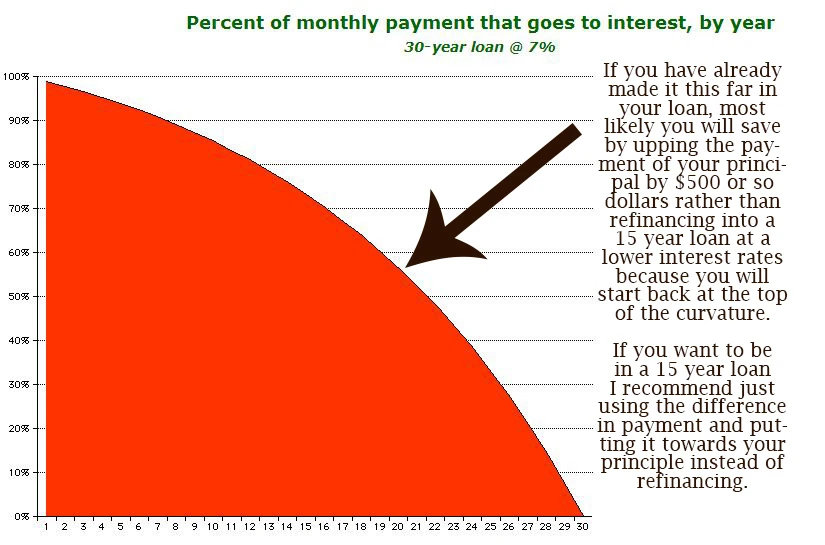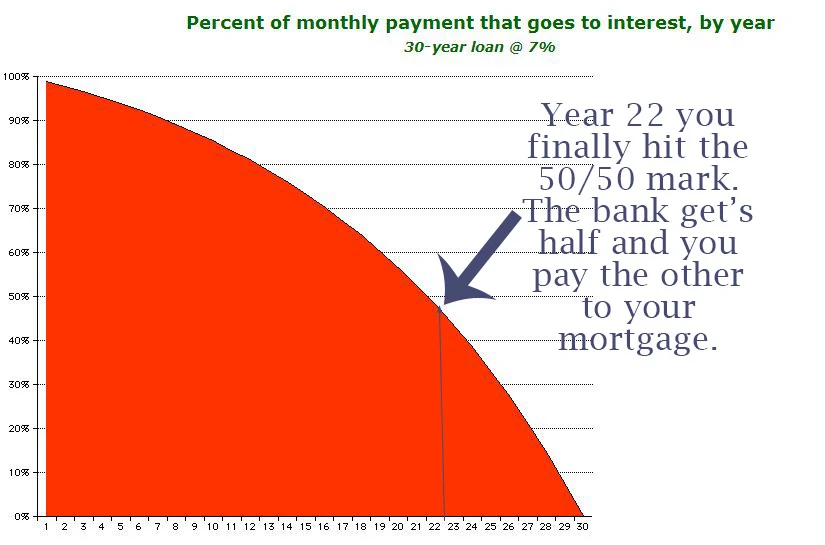There are many unique situations when people begin to think about refinancing. My first piece of advice is this: Never make any decision before you have spent plenty of time studying, researching, calculating and recalculating the numbers. Don’t just trust what the brokers say; it’s not always smart to ask advice from the people who only get paid if you DO decide to refinance.
When I was pregnant our ten year loan schedule started to make me a little nervous. I was worried that when I started to stay at home we wouldn’t have enough money to make all of our payments (plus another family member to pay for as well). At four months until my due date I became severely limited physically due to PGP and I had to start working from home. I went from a salary position to hourly rate with fewer hours. As a result we took a pretty big pay cut the four months leading up to our sons birth, which made me even more concerned about our financial ability to pay such a high mortgage. So I began looking into the option to refinance into a lower payment loan.
I spent a lot of time researching the option to refinance. I had conference calls with multiple mortgage brokers, took notes, crunched numbers, and ultimately decided that refinancing was going to COST us a lot more than I was expecting. We decided to find extra ways to save and make money and to stay on schedule with our mortgage payment plan.
Not every situation is like ours. It may be the right thing for you, I don’t know. That is why I wrote the Pros and Cons I learned about refinancing.
Pros
Pro: Say you have a 30 year loan with a high interest rate and mortgage insurance. You have saved up enough that you would be able to refinance into a 15 or 10 year loan at a much lower interest rate and cut the PMI out entirely. You have crunched the numbers, adding the fees associated with the refinance AND comparing the amount of interest you will have to pay over the life of the new loan with the amount of interest you have to pay on the remainder of your current loan. After all of this, you found that you can save by refinancing. In this case (as long as you checked and rechecked the numbers) refinancing can be a good idea.
Pro: Say you have a balloon interest rate on your mortgage. It is locked in for only a few years at a low rate, but after that it will start rising (hence the name balloon). If you know that you are going to be in the home for a long length of time (at least over the next few years) you should do everything you can to get into a fixed interest rate mortgage, even if it costs a little on the front end. Balloon interest rates are merciless to the long-term home or property owner.
Pro. You have lived in your home for at least a few years and find out that you and/or a spouse are going to lose the major source of income. As long as you KNOW (to the best of your knowledge) that you will still be able to make your mortgage payment (if lowered by refinancing), AND the necessary payments needed to stay alive and functioning will still be covered, AND you don’t want to sell, then I recommend trying to keep your home. Refinancing while you have steady income into a lower payment plan can be smart. Also, taking equity out of your home to pay it’s payments while you look for a new job can also be wise. The trick is, you have to do this before the income stops. The banks need to see steady income to approve a refinance. If you can refinance quickly into a 30 or even 40 year loan and cash out some of your equity to make sure you can pay your payment until you get another job then refinancing may have just saved your house.
If you just wait until the income stops you may be forced to foreclose (losing all the built up equity) if you can’t sell your home in time. If you can refinance and use the equity to pay your home loan, you buy yourself precious time to get another source of income secured before defaulting.
Pro: This is only for those who know exactly what I am talking about. If you have investment opportunities where the principle is almost 100% secure (real estate, life insurance, possibly precious metals) a pro to refinancing is using your equity to grow wealth. If you can get a much higher interest rate investing in secure investments than you are paying on your home it may be a good move. I personally love security too much to do this, but I know many millionaires who utilize their equity in their homes and invest that money. They can earn three times the interest (sometimes more) on the same dollars. I really discourage anyone from doing this who isn’t investment savvy AND who isn’t sure that their principle is secured. Jimmy Buffet said the number one rule to investing is to NEVER LOSE YOUR PRINCIPLE. The number two rule is to NEVER FORGET RULE #1. If in doubt don’t invest the money that provides a roof over your head…. And NO MATTER what, stay far away from the stock market when it comes to your security/home funds. I know too many people who have lost everything if not almost everything. I invested in the market for five years in very wise investments and I came out five years later much poorer (even though I sold when the market was up again). Once the market goes down it takes two times longer to make a profit because you have to make up for what you have lost before you can gain again. Market, in most cases, equals loss.
Cons
When you refinance your amortization schedule starts over. When you buy a mortgage, the first 22 years on a 30 year loan with a 7% interest rate costs more in interest than you are paying off towards the principle. You could be paying a thousand dollars a month ($12,000 a year) and at the end of the first year have only paid off $840.00 on your principle. The next year you may have paid off a total of $2,000 over those two years. If you go refinance you could end up paying much more in fees than you have even paid towards your principle. Finally, in year 22, you will pay $6,000 in principle that year and the bank gets the other $6000 in interest.
Con- You empower the BIG BAD BANKS. I don’t care what your political stance or even if you work at a bank. It’s common knowledge that banks are after two things and two things only: money and power.
As I wrote in the article, banks entice American’s to refinance or sell. The average American does this every 8 years. Therefore, the banks keep earning 97-82% interest on all of the 30 year mortgages out there. Granted, oftentimes when you refinance you most likely won’t be starting your loan at the same place (dollar amount) as you started it years earlier, but you will most likely start paying more of a percentage towards interest no matter what the amount is that you refinanced. Crunch the numbers again and again and be very careful. Consider whether you will be staying in this home for a lifetime or just a few years. More than likely, by refinancing you are handing the bank over even MORE money than you would have if you had had just increased the amount you put towards principle monthly and pay your loan off faster.

Con- The refinancing fees. Refinancing is not free. In fact, when I was talking to multiple different brokers the LOWEST rate I could find to refinance is $2,500!!+ more FEES!! It was going to cost us at least $4,000 to refinance after all was said and done. We would have lowered our interest rate .25% and consolidated our car loan etc. But after crunching the numbers what seem like a hundred times we lost every time. Beware of the massive amount of money the refinancing fee is. If you are on a 30 year loan you might have only paid $4,000 down in principle the first 4 years of paying off your loan. Depending on the new terms of the loan and how long you plan to stay in the house, you will probably save much much more by applying that $4,000 to the principle of the loan instead of paying it towards fees to refinance.
Con- Time, paperwork, and inconvenience. When we were closing on our home I was busy (as well as my wonderful real estate agent Susy Foster and our awesome mortgage loan officer) almost everyday for 45 days, gathering paperwork, faxing documents, confirming tax papers, etc. It took so much time to secure the home loan. My husband and I both had to take a total of a full day off of work and spent hours on closing. Refinancing is also going to take time and hassle. If you can avoid it I highly recommend it.
Con- Your credit score has to be pulled when you refinance. If you decide to shop around to try to secure the best broker (which I recommend if you are set on refinancing) for the lowest cost, each one will ask you if they can pull your credit before they quote you. After your credit is pulled multiple times it starts to effect the score. I ALWAYS said no to them pulling my credit score and eventually, after they realized how resolute I was on getting a quote without them messing with my credit, they would tell me the flat refinancing fee or the percentage they charge – EVERY single time. Don’t allow them to tell you they can’t help you until they pull your credit. Just tell them you will move on to the next broker. Stick to your guns and you will get answers.
Con- Having to have a home appraisal done. I prepped for weeks before our appraiser came (the first time we had an appraiser was after four months of a whole-home-renovation). It cost me a lot of money to clean up the house and yard, get new mulch, buy new outside lighting, take a day off work (because he could only come during the day), etc. When we were thinking about refinancing I cringed thinking that I’d have to prepare and clean every nook and cranny like that again. Oh, and usually you have to pay for this appraisal which runs anywhere from $400-$1,000 depending on location.
So there you have it. My pros and cons to refinancing.
If you are in a life changing situation as mentioned above perhaps refinancing is the wisest thing to do.
In most cases you could pay your mortgage off faster by applying what you were going to spend on the refinancing fees to the principle and setting up a higher payment plan. If your main goal is to pay your house off sooner then crunch the numbers to make sure you know what you are doing before starting the amortization schedule all over again! My guess is that you will save by NOT refinancing… but there are odd situations where this is not the case.
Do you have a pro or con to add if so please respond to the email I sent you with this link in it.


